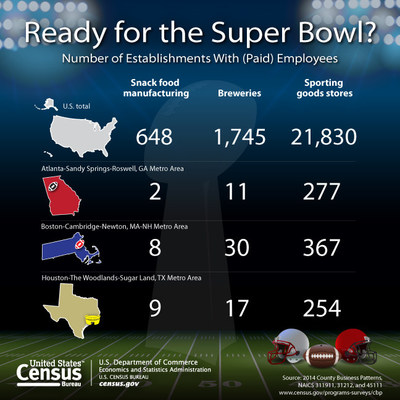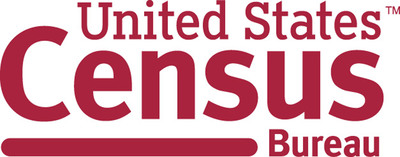|
03.02.2017 22:20:00
|
U.S. Census Bureau Facts for Features: Super Bowl 51: Feb. 5, 2017
WASHINGTON, Feb. 3, 2017 /PRNewswire-USNewswire/ -- Super Bowl 51 will be played Feb. 5, 2017 at NRG Stadium in Houston, Texas. The first Super Bowl was played on Jan. 15, 1967, at Los Angeles Memorial Coliseum, with the Green Bay Packers beating the Kansas City Chiefs 35-10. This will be the third time the NFL's championship game will be held in Houston. In the last one, the New England Patriots beat the Carolina Panthers 32-29 in 2004.

The U.S. Census Bureau has compiled a collection of demographic and economic statistics examining the host metropolitan area, as well as the metro areas represented by the two participating teams — the Atlanta Falcons and the New England Patriots.
Atlanta
463,878
The population of Atlanta, Ga., in 2015.
Source: Vintage 2015 Population Estimates
www.census.gov/quickfacts/table/PST045216/00,1304000
9th
The ranking of the Atlanta metro area on the list of the nation's most populous metropolitan areas in 2015. The estimated population of the Atlanta-Sandy Springs-Roswell, Ga., metro area on July 1, 2015, was 5,710,795. The Atlanta metro area gained 95,431 people from July 1, 2014, to July 1, 2015.
Source: Vintage 2015 Population Estimates https://factfinder.census.gov/bkmk/table/1.0/en/PEP/2015/PEPANNCHG.US24PR
37.0%
The percentage of Atlanta metro area residents age 25 and older who had a bachelor's degree or higher in 2015; 88.7 percent had at least graduated from high school. The respective national figures were 30.6 percent and 87.1 percent.
Source: 2015 American Community Survey
https://factfinder.census.gov/bkmk/table/1.0/en/ACS/15_1YR/S1501/0100000US|310M200US12060
18.1%
The percentage of Atlanta metro area residents age 5 and older who spoke a language other than English at home in 2015. The national average was 21.5 percent.
Source: 2015 American Community Survey
https://factfinder.census.gov/bkmk/table/1.0/en/ACS/15_1YR/S1601/0100000US|310M200US12060
$60,219
The median household income for the Atlanta metro area in 2015. The national median was $55,775.
Source: 2015 American Community Survey
https://factfinder.census.gov/bkmk/table/1.0/en/ACS/15_1YR/S1901/0100000US|310M200US12060
$186,300
The median home value of owner-occupied homes in the Atlanta metro area in 2015. The national median was $194,500.
Source: 2015 American Community Survey
https://factfinder.census.gov/bkmk/table/1.0/en/ACS/15_1YR/B25077/0100000US|310M200US12060
31.3 minutes
The average amount of time it took Atlanta metro area residents to get to work in 2015; 77.9 percent of the metro area's workers drove to work alone, 9.6 percent carpooled and 3.1 percent took public transportation. Nationally, it took an average of 26.4 minutes to get to work.
Source: 2015 American Community Survey
https://factfinder.census.gov/bkmk/table/1.0/en/ACS/15_1YR/S0801/0100000US|310M200US12060
2
The number of snack food manufacturing establishments in the Atlanta metro area in 2014. In addition, there were 11 breweries and 277 sporting goods stores in the Atlanta metro area.
Source: 2014 County Business Patterns
https://factfinder.census.gov/bkmk/table/1.0/en/BP/2014/00A1/310M200US12060/naics~31191|31212|45111
New England
667,137
The population of Boston, Mass., in 2015.
Source: Vintage 2015 Population Estimates
www.census.gov/quickfacts/table/PST045216/2507000,00
10th
The ranking for Boston on the list of the nation's most populous metropolitan areas in 2015. The estimated population of the Boston-Cambridge-Newton, Mass.-N.H., metro area on July 1, 2015, was 4,774,321. The Boston metro area gained 34,936 people from July 1, 2014, to July 1, 2015.
Source: Vintage 2015 Population Estimates https://factfinder.census.gov/bkmk/table/1.0/en/PEP/2015/PEPANNCHG.US24PR
46.0%
The percentage of Boston metro area residents age 25 and older who had a bachelor's degree or higher in 2015; 91.4 percent had at least graduated from high school. The respective national figures were 30.6 percent and 87.1 percent.
Source: 2015 American Community Survey
https://factfinder.census.gov/bkmk/table/1.0/en/ACS/15_1YR/S1501/0100000US|310M200US14460
24.3%
The percentage of Boston metro area residents age 5 and older who spoke a language other than English at home in 2015. The national average was 21.5 percent.
Source: 2015 American Community Survey
https://factfinder.census.gov/bkmk/table/1.0/en/ACS/15_1YR/S1601/0100000US|310M200US14460
$78,800
The median household income for the Boston metro area in 2015. The national median was $55,775.
Source: 2015 American Community Survey
https://factfinder.census.gov/bkmk/table/1.0/en/ACS/15_1YR/S1901/0100000US|310M200US14460
$393,000
The median home value of owner-occupied homes in the Boston metro area in 2015. The national median was $194,500.
Source: 2015 American Community Survey
https://factfinder.census.gov/bkmk/table/1.0/en/ACS/15_1YR/B25077/0100000US|310M200US14460
31.4 minutes
The average amount of time it took Boston metro area residents to get to work in 2015; 66.8 percent of the metro area's workers drove to work alone, 7.0 percent carpooled and 13.6 percent took public transportation. Nationally, it took an average of 26.4 minutes to get to work.
Source: 2015 American Community Survey
https://factfinder.census.gov/bkmk/table/1.0/en/ACS/15_1YR/S0801/0100000US|310M200US14460
8
The number of snack food manufacturing establishments in the Boston metro area in 2014. There were 30 breweries and 367 sporting goods stores in the Boston metro area.
Source: 2014 County Business Patterns
https://factfinder.census.gov/bkmk/table/1.0/en/BP/2014/00A1/310M200US14460/naics~31191|31212|45111
Host Site – Houston, Texas
2,296,224
The population of Houston, Texas, in 2015, the location of NRG Stadium where Super Bowl 51 will be played.
Source: Vintage 2015 Population Estimates
www.census.gov/quickfacts/table/PST045214/0669084,00
5th
The ranking of the Houston metro area on the list of the nation's most populous metro areas in 2015. The estimated population of the Houston-The Woodlands-Sugar Land, Texas, metro area on July 1, 2015, was 6,656,947. The Houston metro area gained 159,083 people from July 1, 2014, to July 1, 2015.
Source: Vintage 2015 Population Estimates
https://factfinder.census.gov/bkmk/table/1.0/en/PEP/2015/PEPANNCHG.US24PR
31.5%
The percentage of Houston metro area residents age 25 and older who had a bachelor's degree or higher in 2015; 82.3 percent had at least graduated from high school. The respective national figures were 30.6 percent and 87.1 percent.
Source: 2015 American Community Survey
https://factfinder.census.gov/bkmk/table/1.0/en/ACS/15_1YR/S1501/0100000US|310M200US26420
38.5%
The percentage of Houston metro area residents age 5 and older who spoke a language other than English at home in 2015. The national figure was 21.5 percent.
Source: 2015 American Community Survey
https://factfinder.census.gov/bkmk/table/1.0/en/ACS/15_1YR/S1601/0100000US|310M200US26420
$61,465
The median household income for the Houston metro area in 2015. The national median was $55,775.
Source: 2015 American Community Survey
https://factfinder.census.gov/bkmk/table/1.0/en/ACS/15_1YR/S1901/0100000US|310M200US26420
$168,300
The median home value of owner-occupied homes in the Houston metro area in 2015. The national median was $194,500.
Source: 2015 American Community Survey
https://factfinder.census.gov/bkmk/table/1.0/en/ACS/15_1YR/B25077/0100000US|310M200US26420
30.2 minutes
The average amount of time it took Houston metro area residents to get to work in 2015; 80.7 percent of the metro area's workers drove to work alone, 10.1 percent carpooled and 2.2 percent took public transportation. Nationally, it took an average of 26.4 minutes to get to work.
Source: 2015 American Community Survey
https://factfinder.census.gov/bkmk/table/1.0/en/ACS/15_1YR/S0801/0100000US|310M200US26420
9
The number of snack food manufacturing establishments in the Houston metro area in 2014. In addition, there were 17 breweries and 254 sporting goods stores in the Houston metro area.
Source: 2014 County Business Patterns
https://factfinder.census.gov/bkmk/table/1.0/en/BP/2014/00A1/310M200US26420/naics~31191|31212|45111
Following is a list of observances typically covered by the Census Bureau'sFacts for Features series:
African-American History Month (February) | Labor Day (1st Monday in September) |
Super Bowl (first Sunday in February) | Grandparents Day (1st Sunday after Labor Day) |
Valentine's Day (Feb. 14) | Hispanic Heritage Month (Sept. 15-Oct. 15) |
Women's History Month (March) | Unmarried and Single Americans Week (3rd week of September) |
Irish-American Heritage Month (March)/St. Patrick's Day (March 17) | Halloween (Oct. 31) |
Earth Day (April 22) | American Indian/Alaska Native Heritage Month (November) |
Asian/Pacific American Heritage Month (May) | Veterans Day (Nov. 11) |
Older Americans Month (May) | Thanksgiving Day (4th Thursday in November) |
Mother's Day (2nd Sunday in May) | The Holiday Season (December) |
Hurricane Season Begins (June 1) | |
Father's Day (third Sunday in June) | |
The Fourth of July (July 4) | |
Anniversary of Americans with Disabilities Act (July 26) | |
Back to School (August) |
Editor's note: The preceding data were collected from a variety of sources and may be subject to sampling variability and other sources of error. Facts for Features are customarily released about two months before an observance in order to accommodate magazine production timelines.
Amanda Perry
Public Information Office
301-763-3030 / pio@census.gov
Graphic | JPG | PDF |
census.gov
Connect with us on Social media

To view the original version on PR Newswire, visit:http://www.prnewswire.com/news-releases/us-census-bureau-facts-for-features-super-bowl-51-feb-5-2017-300402119.html
SOURCE U.S. Census Bureau
 Der finanzen.at Ratgeber für Aktien!
Der finanzen.at Ratgeber für Aktien!
Wenn Sie mehr über das Thema Aktien erfahren wollen, finden Sie in unserem Ratgeber viele interessante Artikel dazu!
Jetzt informieren!